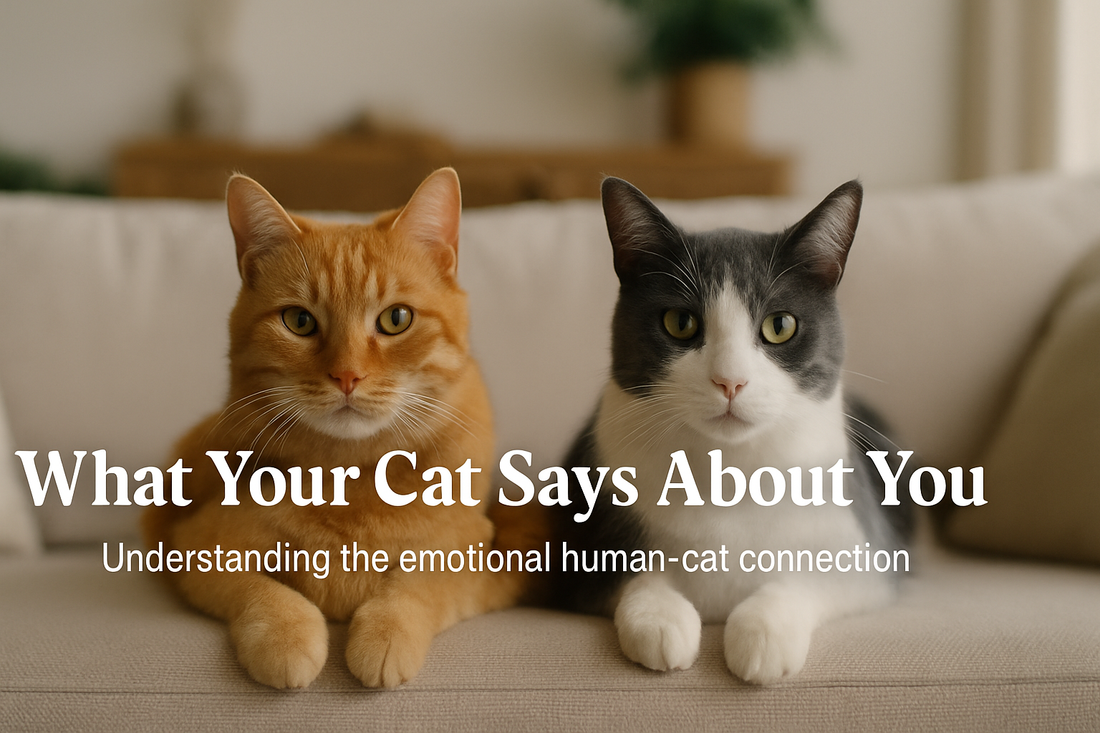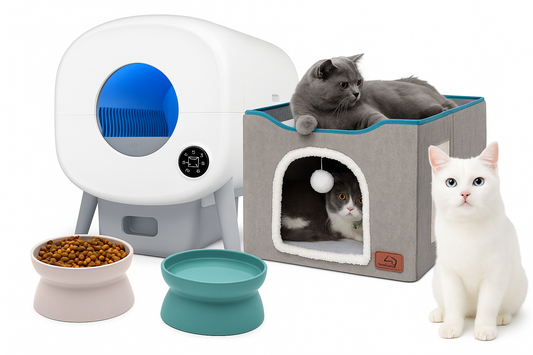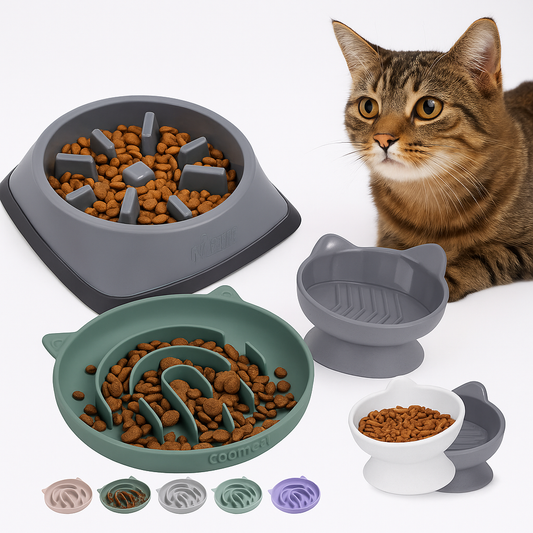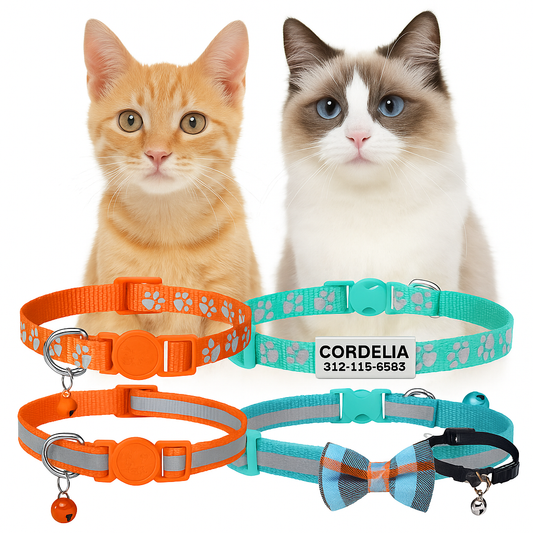
What Your Cat’s Personality Says About You
Let’s be real—cat people have a vibe. We narrate our cats' thoughts out loud, send blurry cat pics to our friends like proud parents, and treat a purr like emotional validation. And yeah, we’ve all surrendered to the fact that fur is just part of the wardrobe now.
But here's the thing: our connection to cats runs deeper than just funny habits or shared couch time. The way your cat acts? It’s not random. It says something—about them and about you.
If you've ever thought, "Wow, my cat kind of has my attitude," that's not just in your head.
In this post, we’re diving into cat personality types, what they reveal about you as a person, and how science is starting to back up what every cat owner already suspects: your cat might be your tiny, judgmental mirror.
Why Cat Personality Types Aren’t Just for Fun
Cat personalities aren’t just cute quirks—they’re a behavioral language. Recognizing your cat's personality helps you respond better to their needs, build trust, and even improve your communication. And when you start seeing patterns between your cat’s personality and your own, it opens up a fascinating question: are our cats a reflection of us?
According to a 2019 study conducted by researchers from the University of Lincoln and Nottingham Trent University, cats' personalities are heavily influenced by their human companions. The study found that owners who scored higher on the neuroticism scale were more likely to report their cats as having behavioral problems, displaying more aggressive and anxious/fearful behaviors, and experiencing stress-related health issues. Conversely, owners with higher levels of agreeableness, conscientiousness, and openness tended to have cats with more positive behavioral traits and better overall wellbeing.
In short, your emotional state doesn’t just affect you—it affects your cat, too.
The 5 Core Cat Personality Types (and Their Human Mirrors)
Veterinary behaviorists often group feline behavior into five core personality types. These aren’t strict categories—your cat might overlap a bit—but chances are, one will feel eerily accurate.
1. The Human-Lover Cat 🐾 (aka the Shadow)

Traits: Affectionate, always nearby, lap-lover, follows you from room to room.
You Might Be: Emotionally warm, nurturing, maybe even a bit co-dependent (in a sweet way).
This is the kind of cat that insists on sleeping under the covers with you, stares into your soul when you're on the phone, and head-butts your laptop during meetings. You’re never really alone because they won’t let you be.
What it says about you: You’re emotionally present and crave connection. You might be the kind of person who gets energy from others, keeps close friendships, and checks in on loved ones "just because." You likely create a home environment that feels safe—and your cat thrives in it.
2. The Adventurer Cat 🐅 (aka the Hunter)
Traits: High energy, prey-driven, loves exploration, gets zoomies at 2 a.m.
You Might Be: Energetic, curious, spontaneous, thrives on variety and challenge.
This is the cat who makes cardboard boxes into jungle gyms and tries to leap onto shelves five feet off the ground. If they could skateboard, they would.
What it says about you: You live for stimulation. Whether it’s creative projects, travel, or late-night ideas, your brain is always moving—and so is your cat. You probably appreciate independence in your relationships and value freedom (for yourself and your pet). People like you often see their cat as an equal, not a dependent.
3. The Thinker Cat 🧠 (aka the Analyst)
Traits: Watchful, strategic, slow to warm up but deeply loyal once they do.
You Might Be: Introverted, intelligent, patient, highly aware of your surroundings.
Thinkers are the chess players of the cat world. They observe everything, rarely act without purpose, and often come across as mysterious. They need mental stimulation and tend to avoid chaos or sudden change.
What it says about you: You’re introspective and calculated. You probably research everything before making a decision (even the type of litter box). Your cat’s behavior mirrors your respect for space, nuance, and subtlety. You're not loud about your love—but it's constant.
4. The Lone Wolf Cat 🐺 (aka the Cantankerous One)

Traits: Aloof, independent, doesn’t care about your approval—but secretly does.
You Might Be: Independent, values alone time, emotionally self-contained.
You don’t own this cat—you cohabitate. And honestly, you respect that. They’re not rude; they just know what they want and have zero time for nonsense.
What it says about you: You’re confident, probably a little cynical, and fiercely protective of your time and energy. People like you don’t need validation to feel good—you know your worth. And your cat? They love that about you, even if they only show it once a week.
5. The Social Butterfly (with Other Cats) 🐈⬛
Traits: Feline social, loves other cats, low-key with humans.
You Might Be: Community-oriented, collaborative, not overly clingy in relationships.
These cats are the ultimate extroverts within their species. They thrive in multi-cat homes, enjoy synchronized naps, and might even "adopt" other pets.
What it says about you: You’re probably someone who thrives in group settings—dinners, game nights, team projects. You might not always demand attention, but you enjoy being part of a “vibe.” Your home likely has an energy of openness and flow.
Breed-Specific Behaviors: What Your Choice Says About You
If your cat is a specific breed—or even has a strong breed influence—their behavior might tell an even more specific story about you.
Here’s a quick personality map:
- Siamese – You’re expressive, chatty, and love a good back-and-forth. You likely value emotional feedback and storytelling.
- Persian – You like things clean, soft, and calm. Aesthetics matter to you, and your home is probably a comfort zone.
- Bengal – You’re high-energy, ambitious, and not afraid of attention. People like you think ten steps ahead.
- Maine Coon – You’re a friendly giant. Approachable, grounded, and quietly confident. You have “protective parent” energy.
- Sphynx – You’re a rebel in the best way. Bold, unconventional, and drawn to things that others might shy away from.
- Russian Blue – You seek peace and privacy. Your inner world is rich and you’re not easily shaken by trends or peer pressure.
Even mixed-breed cats inherit some traits. The fact that you chose a certain breed or temperament can still reveal a lot about your values and lifestyle.
The Emotional Feedback Loop Between Cats and Humans
Here’s where it gets real: cats don’t just reflect their owners—they respond to them. There’s a kind of unspoken emotional loop between you and your cat. When you’re calm, your cat tends to relax. When you’re anxious or stressed? You might notice them hiding more, acting skittish, or even becoming a little snippy.
It’s not just intuition—it’s science. Cats are highly sensitive to tone, energy, and consistency. Researchers have observed that cat behavior often changes in response to their owner's emotional state, creating what’s essentially a feedback loop. The more reactive we are, the more reactive they become—and vice versa.
This idea actually ties back to something we talked about in our earlier blog, “Signs You’re a ‘Crazy Cat Person’”. That post highlighted how self-aware cat people tend to be—especially when it comes to respecting their cat’s moods and quirks. Being tuned into your cat’s needs isn’t just part of the “crazy cat person” identity—it’s also the foundation of a responsive, emotionally healthy relationship.
So if your cat suddenly starts acting off, it might not be random. It might be them reflecting something going on with you. The energy you bring into your home isn’t invisible to your cat—it’s the air they live in.
The bottom line? Cats pick up more than we give them credit for. And when we stay emotionally grounded, they often do, too.
Your Cat as a Mirror (Or a Teacher)

Whether we want to admit it or not, our pets often reveal things about us we weren’t fully aware of. Maybe your anxious cat is reflecting stress you haven’t dealt with. Maybe your chill cat is a result of the calm environment you’ve cultivated. Or maybe your fiercely independent cat is teaching you a lesson in respecting boundaries.
In that way, cats don’t just reflect personality—they sharpen it. They teach us about patience, emotional regulation, and nonverbal trust. They’re also one of the few relationships where no performance is required. Your cat doesn’t care how you dress, what you do for work, or whether you’re crushing life that week. They care if they feel safe around you. That’s it.
And that kind of honest, zero-judgment relationship? It says a lot about what we value at our core.
Final Thoughts: Who’s Training Who?
It’s easy to think we’re the ones training our cats, shaping their behavior with treats and toys. But more often than not, they’re shaping us. They adjust our routines, change how we communicate, and remind us to slow down, sit still, and just exist together.
So next time your cat curls up in your lap uninvited, or ignores you all day only to cuddle at 11:52 PM—ask yourself not, “Why is she like this?” but “Why am I?”



